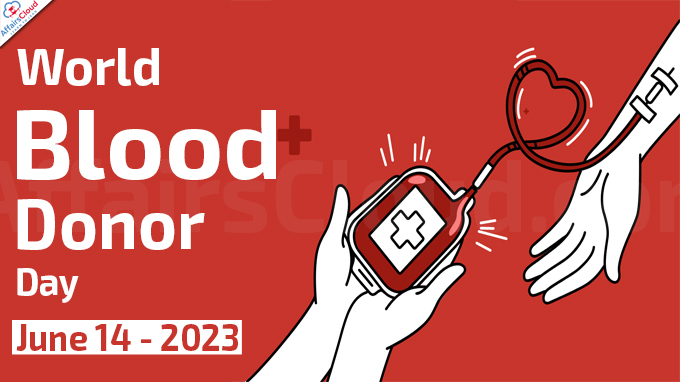 World Blood Donor Day (WBDD) is annually observed on 14th June across the world to raise awareness about the significance of donating blood, and to thank voluntary, unpaid blood donors for their life-saving gifts of blood.
World Blood Donor Day (WBDD) is annually observed on 14th June across the world to raise awareness about the significance of donating blood, and to thank voluntary, unpaid blood donors for their life-saving gifts of blood.
The annual observance of WBDD is led by the World Health Organization (WHO).
The slogan/theme for 2023 WBDD campaign is “Give blood, give plasma, share life, share often.”
- The 2023 slogan focuses on patients requiring life-long transfusion support and highlights the role of every single donor, who gives the valuable gift of blood or plasma.
Significance:
The day also emphasises the need for safe blood like Red blood cells (RBC), White blood cells (WBC), etc., and blood products, which are any therapeutic substance derived from human blood, plasma-derived medicinal products and so on.
Host country for WBDD 2023:
Algeria is the host country for the global event of WBDD 2023. The events are organised through Algeria’s National Blood Transfusion Service.
Background:
i. In 2004, the WHO initiated and established the observance of World Blood Donor Day on 14th June to mark the birth Anniversary of Karl Landsteiner (1868-1943), Austrian-American immunologist.
ii. Following the successful observance of the WBDD 2004, in May 2005, the World Health Assembly (WHA) adopted a resolution WHA58.13 titled “Blood safety: proposal to establish World Blood Donor Day” and agreed to observe 14th June every year as WBDD.
- WBDD is celebrated as an integral part of the national blood donor recruitment programme.
Karl Landsteiner:
Karl Landsteiner was born on14th June 1868 in Vienna, Austrian Empire (now Austria).
Karl Landsteiner was honoured with the Nobel Prize in Physiology or Medicine 1930 for his discovery of human blood groups
Objectives of WBDD 2023:
- To celebrate and thank individuals who donate blood and encourage more people to become new donors;
- To encourage people in good health to donate blood regularly, to transform the quality of life for transfusion dependent patients and help to build a secure blood supply in all countries in the world;
- To highlight the critical roles of voluntary non-remunerated regular blood and plasma donations in achieving universal access to safe blood products for all populations;
- To mobilise support at national, regional and global levels among governments and development partners to invest in, strengthen and sustain national blood programmes.
Additional Info:
i. About 118.54 million blood donations are collected worldwide and over 40% of these are collected in high-income countries.
ii. In low-income countries, up to 54% of blood transfusions are given to children under 5 years of age; and in high-income countries, 76% of all transfusions are given to the people over 60 years of age.
iii. Based on samples of 1000 people, the median blood donation rate is 31.5 donations in high-income countries, 16.4 donations in upper-middle-income countries, 6.6 donations in lower-middle-income countries and 5.0 donations in low-income countries.
About World Health Organization (WHO):
Founded in– 1948
Director-General– Dr Tedros Adhanom Ghebreyesus
Headquarters– Geneva, Switzerland




